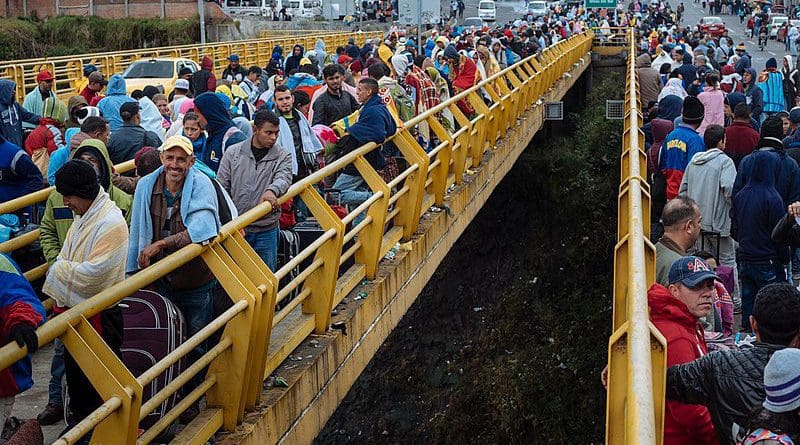Solutions To Human Rights Violations, Displace Nearly A Fifth Of Venezuelans – OpEd
Second, only to Syria, in terms of external displacements, Venezuela has been hit hard. Since 2015, of its population of 30 million, almost a fifth – more than 5.6 million – have left the South American country to “escape political, economic and social hardships.” Since oil was discovered in the country in the 1920s, it has taken Venezuela on a ride that offers textbook lessons to resource-rich states. The government has been said to be “highly dependent on income from fossil fuels, power is concentrated in an elite minority and corruption is spread beyond control.”
Yet, besides being the largest external displacement crisis in the region’s history, it remains grossly underfunded. Just to put things in perspective, the total funding per capita for Syrian refugees was more than 10 times that for Venezuelans – at $3,150 compared with $265, based on figures for 2020; this, while Venezuela remains second in the world and only to Syria in terms of external displacement.
And now, with the COVID-19 situation and the border closing, migration has been hit hard. By December 2020, 3.9 million Venezuelans were designated as being displaced abroad without formal refugee status – but still judged ‘in need of international protection.’ The number rose from 3.6 million in 2019.
Incidentally, a majority of refugees are being hosted in Latin America and the Caribbean; Colombia hosts more Venezuelans than any other country, accounting for 1.73 million people. Why, Colombia has even announced a 10-year legal status would be granted to its undocumented Venezuelans in a far-reaching humanitarian gesture.
Concurrently, the U.S. government is granting Venezuelans living in the US, temporary protected status for 18 months. Since 2017, the U.S. has sanctioned people, businesses and oil entities associated with President Maduro’s regime, apparently, to ensure that Maduro and his cronies don’t profit from illegal gold mining, state-operated oil operations or other business transactions that would enable the regime’s criminal activity and “human rights abuses.”
And then, to ensure the reach of ‘human rights’ to Venezuelan migrants, United States, offers an 18-month temporary protected status! Now, millions of Venezuelans face the music for having originated from a country that was associated with “Maduro and his cronies.” Apparently, buckling under the pressure, President Maduro is said to be softening his stand towards the U.S. as just last month, he agreed to sit with the opposition under the mediation of the international community, specifically with the help of the European Union, the EU-led International Contact Group on Venezuela and Norway.
Fact remains that it was more than 15 years of U.S. sanctions that caused Venezuela’s petroleum industry to collapse sending the crisis-driven Latin American state to the brink of abject ruin. Once South America’s most stable democracy and richest country, Venezuela is looking down the barrel and it has nothing to do with ‘War’, ‘Conflict’ or ‘Disease’.
‘Sanctions’ are an antithesis of the very free trade and competition; most developed nations advocate also unabashedly in the same breath. Reasons cited for U.S. sanctions on Venezuela include, oddly, the nation’s “poor human rights record” besides others but the sanctions, themselves, triggered the world’s second-largest external displacements triggering a refugee crisis that is overtly downplayed for obvious reasons.
To put things in perspective, compare the 5.6 million Venezuelans displaced from Venezuela against 0.7 million Rohingyas displaced from Myanmar.

